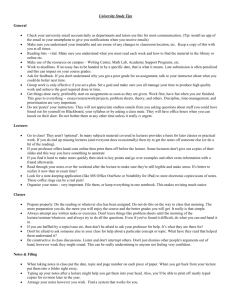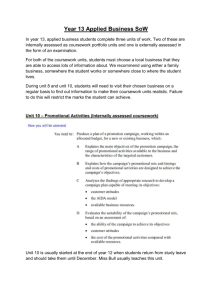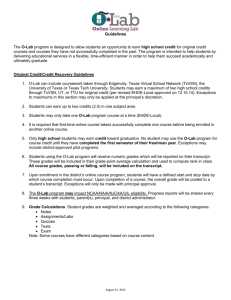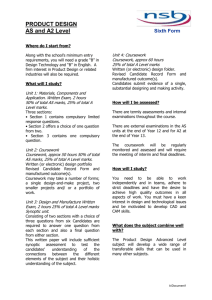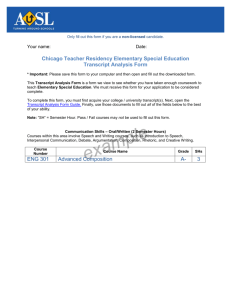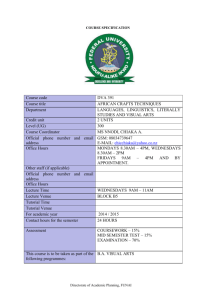Master of Science in Clinical Investigation Sciences v2015.06.30
advertisement
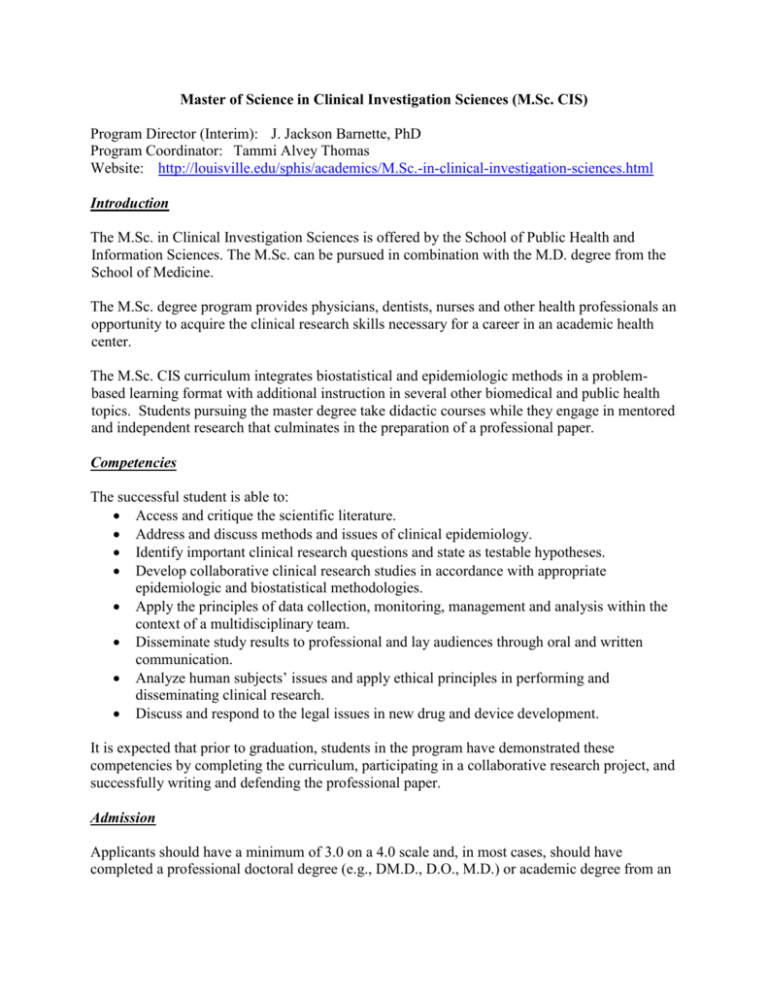
Master of Science in Clinical Investigation Sciences (M.Sc. CIS) Program Director (Interim): J. Jackson Barnette, PhD Program Coordinator: Tammi Alvey Thomas Website: http://louisville.edu/sphis/academics/M.Sc.-in-clinical-investigation-sciences.html Introduction The M.Sc. in Clinical Investigation Sciences is offered by the School of Public Health and Information Sciences. The M.Sc. can be pursued in combination with the M.D. degree from the School of Medicine. The M.Sc. degree program provides physicians, dentists, nurses and other health professionals an opportunity to acquire the clinical research skills necessary for a career in an academic health center. The M.Sc. CIS curriculum integrates biostatistical and epidemiologic methods in a problembased learning format with additional instruction in several other biomedical and public health topics. Students pursuing the master degree take didactic courses while they engage in mentored and independent research that culminates in the preparation of a professional paper. Competencies The successful student is able to: Access and critique the scientific literature. Address and discuss methods and issues of clinical epidemiology. Identify important clinical research questions and state as testable hypotheses. Develop collaborative clinical research studies in accordance with appropriate epidemiologic and biostatistical methodologies. Apply the principles of data collection, monitoring, management and analysis within the context of a multidisciplinary team. Disseminate study results to professional and lay audiences through oral and written communication. Analyze human subjects’ issues and apply ethical principles in performing and disseminating clinical research. Discuss and respond to the legal issues in new drug and device development. It is expected that prior to graduation, students in the program have demonstrated these competencies by completing the curriculum, participating in a collaborative research project, and successfully writing and defending the professional paper. Admission Applicants should have a minimum of 3.0 on a 4.0 scale and, in most cases, should have completed a professional doctoral degree (e.g., DM.D., D.O., M.D.) or academic degree from an accredited institution or its equivalent. Other applicants with research experience may be considered (e.g., research coordinator). Application requirements are submitted to the Graduate School Office of Admissions and include: Formal application Curriculum vitae Personal statement, a one-page essay that discusses the student’s background and his or her long-term goals in clinical research Application fee A minimum of two letters of recommendation Official transcripts of all postsecondary coursework Official scores on the Graduate Record Examination (GRE) General Test (if applicant does not have a doctoral degree) For specific information about the degree program or the application process, students should contact Dr. Jack Barnette, Interim Program Director, 502-852-8674. The application for the M.Sc. is found at: http://louisville.edu/graduate/futurestudents/apply-materials/application Curriculum The M.Sc. curriculum has been designed in such a way that a fulltime student could complete the degree in one calendar year. However, it is expected that most students will take longer than one year to complete the M.Sc. The typical progression through the M.Sc. curriculum is: Develop program of study Take coursework Select research project and begin work Do research project and prepare professional paper Present and defend research project Faculty Advisor The program director serves as faculty advisor for each student until the student begins his or her research for the professional paper, at which time the student selects a mentor for his or her research with the approval of the program director. The mentor may be any member of the School’s faculty or, upon approval of the program director, a mentor in the student’s laboratory or employment affiliation and assumes the functions of faculty advisor. Program of Study Upon matriculation in the program, each student meets with the program coordinator and develops a program of study based on the student’s time availability (e.g., typical two-year program or extended three-year program). The program of study may be modified as the student’s needs change or course availability is altered. Award of degree from an accredited school of public health requires successful completion of the equivalent of three semester-credit hours in each of: Instruction that provides a broad overview of public health Instruction in epidemiology Either or both of these requirements may be determined to have been met prior to matriculation by approval of the academic dean of a variance request submitted by the program director. The request for a variance in one or both requirements must be justified by one of: previous degrees received, such as an M.P.H. or Dr.P.H.; previous coursework successfully completed; or extensive experience in the public health workforce. In the absence of a variance for a requirement, the coursework included in the M.Sc. program satisfies both requirements. Degree Requirements Coursework 31 total credit hours of required coursework 19 credit hours of required coursework 9 credit hours of elective coursework 3 credit hours of mentored research Required Coursework with Suggested Schedule Semester Fall Spring Summer Course # PHMS-523 PHST-500 PHST-624 PHST-631 Course Title Public Health in the U.S.* Biostatistics I Clinical Trials I Data Collection for Clinical Research Electives Semester Total PHST-501 Biostatistics II Introduction to Clinical PHEP-614 Epidemiology PHST-625 Clinical Trials II PHPH-601 Evaluating Health Care Literature PHPH-632 Ethical Conduct of Research Elective(s) Semester Total PHPH-699 Mentored Research Credit Hours 2 3 2 2 6 15 3 2 2 1 2 3 13 3 Mode of Delivery Hybrid Online Hybrid Hybrid Online Live or Hybrid Hybrid Online Live Required Coursework with Suggested Schedule Semester Course # Course Title Credit Hours 3 31 Mode of Delivery Semester Total Degree Total 9 credit hours of electives PHST-XXX Variable Variable PHEP-XXX Variable Variable PHPB-604 3 Hybrid PHPB-501 2 Hybrid PHPH-610 2 Live ENGL-599 3 Live CECS-536 3 Live SOC- 618 Live 3 * PHMS-523 is required of students who do not have a broad exposure to public health through experience or coursework. It is offered only in the fall semester. Any student who waives out of the course must replace the two semester hours with elective coursework. Professional Paper A professional paper, based on original research conducted by the student, is required of a candidate for the degree of Master of Science in clinical investigation sciences. It is to be an original work of professional quality and a scholarly achievement that demonstrates the student’s thorough understanding of research techniques in clinical research and the ability to conduct independent research. Professional Paper Committee The professional paper is read by a reading committee, chaired by the student’s mentor/faculty advisor, and appointed by the dean of the school upon the recommendation of the program director. This committee consists of three members, and must include one representative of an allied department. The professional paper must be approved by the committee and the program director. Professional Paper Proposal The proposal professional paper is to be developed in written form and presented to the committee for approval. Professional Paper Approval The professional paper is to be submitted in completed form to the chair of the committee at least fourteen days before the end of the term in which the candidate expects to be graduated, and the candidate is not eligible for the final oral examination until the professional paper has been accepted by the committee. The committee schedules an oral examination of the candidate during which the student presents his or her professional paper and is asked to defend it and the supporting research. The professional paper is approved by a majority vote of the committee and by the program director. V2015.6.30


